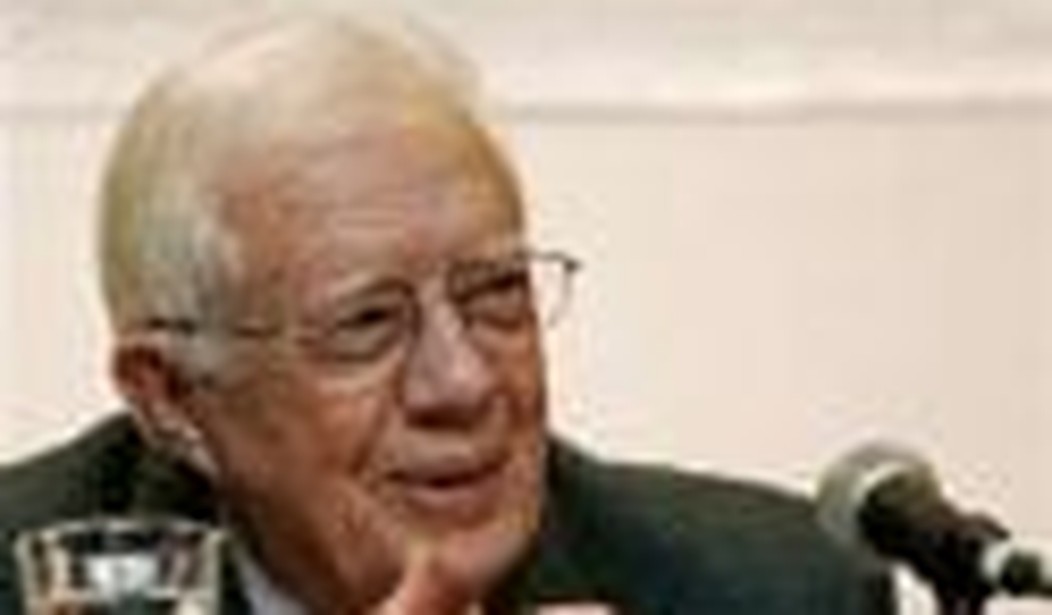Fans of Beitar Jerusalem, the soccer team owned by Russian oligarch Arcadi Gaydamak, surged onto the field in the 86th minute of a game that could have won Beitar the national title for the second year in a row. Beitar was leading 1-0 at the time; now it faces a disciplinary hearing at the hands of the Israeli Soccer Federation.
That is the story that made banner headlines on the front pages of Yedioth Aharonoth and Maariv, Israel’s two mass-circulation Hebrew dailies, on the day Jimmy Carter visited Sderot. The television news broadcasts and radio talk shows were similarly occupied by the Great Soccer Scandal.
Meanwhile, Foreign Minister Tzipi Livni gave a thoughtful speech to a gathering of moderate Arab leaders at the Doha Forum on Democracy, Development and Free Trade 2008. She also responded well to Arab-Israeli MK Ahmed Tibi’s claim that Israel was not a real democracy. “The fact is that you are an MK in Israel, and represent 20 percent of the public, and can say whatever you please. This is the proof that Israel is a democratic state,” said Livni, during a public Q&A session. Tibi aroused controversy when he registered at the Doha Forum as a representative of Palestine, rather than Israel.
And in other news (buried in a tiny item toward the middle of the local news), former US president Jimmy Carter visited Israel and the West Bank.
The visit of the Nobel Peace Prize laureate, and author of Peace, Not Apartheid, to Israel and the Palestinian territories was simply a non-story here. Even the evening news gave the visit only a fleeting mention, with 40-seconds of footage, accompanied by toneless voice-over narration, toward the end of the broadcast.
My feeling is that the media’s lack of interest in the story is a reflection of the Israeli public’s apathy toward peace initiatives in general, and self-appointed private-initiative peace makers with dubious credentials specifically. But a few colleagues claimed that Carter was being ignored as a sort of punishment. Not only was the ex-president urging Israel to negotiate with Hamas, which is classified as a terror organization by the US, EU and Israel, but he also announced plans to meet notorious Hamas military wing leader Khaled Meshal, who is based in Damascus. The Israeli government was enraged. And the Israeli public doesn’t take too kindly to the idea of talking to terrorists, either.
Still, even here in super-liberal Tel Aviv, the fact is that I could not find anyone on the street who could acknowledge anything beyond bare awareness of Carter’s visit.
Curious to know whether the Palestinian street was similarly underwhelmed by the visit of an ex-president who is considered pro-Palestinian, I called a Palestinian friend who is the Ramallah-based correspondent for a major international Arab satellite news channel.
Turns out that the people on the streets of Ramallah didn’t really care about the visit of “an ex-president who is old and has no real power,” either. As for the local media, my Palestinian friend put it like this: “For the Arab media, the really important thing is that Carter made a clear statement in support of negotiations with Hamas.”
“Meaning..?” I asked.
“Meaning that Al Jazeera, which supports the Islamists, gives Carter’s visit lots of coverage, with top billing to his statements about Hamas. Meanwhile, the Palestinian Authority’s satellite television station ignored the statements about Hamas and focused on Carter’s visit to Arafat’s grave.” (the Palestinian Authority is headed by Fatah, which is anti-Hamas).
And that is how reporting the news works in the Middle East. Everyone has an agenda, nobody bothers to pretend otherwise, and the concept of objective reporting is considered laughably naïve.
What I’m wondering is, why hasn’t anyone mentioned the fact that Efraim Halevy, the recently retired former head of the Mossad (and author of Man in the Shadows), also advocates negotiating with Hamas?
Lisa Goldman is a freelance Canadian-Israeli journalist, who blogs at On the Face. She lives in Tel Aviv.









Join the conversation as a VIP Member